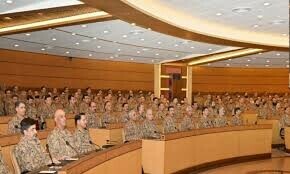IS the US troop surge winning the Afghan war? The Obama administration is reportedly contemplating a longer term presence in Afghanistan even as the Taliban step up attacks. Gen David Petraeus of Central Command believes that the surge is working.
Reportedly, as done previously by Gen Stanley McChrystal, he has created a colour-coded map showing districts, timetables and handover dates, approximating that two-thirds of the country can be handed over within three months. For the US-led combat mission, success is predicted (mistakenly perhaps) only if killing and disrupting radical Taliban militants continues. Key to the counterinsurgency (Coin) strategy is a phased transition after training the Afghan National Army. Obama's War The Washington Post
What is apparent is a climb-down of the 2011 troop withdrawal mantra, with 2014 now being cited as the timeframe until when the US will commit troops. Commanders on the ground say that things would get worse if the job isn't finished properly. In , veteran reporter of , Bob Woodward writes that Petraeus told the White House 'war czar' Gen Douglas Lute last year: “All we have to do is begin to show progress and that will be sufficient to add time to the clock and we'll get what we need.”
Bruce Riedel, a former CIA officer who headed the interagency review of Afghanistan and Pakistan (calling for a troop surge) is certain that despite the war weariness felt in the US and Europe, the Obama administration has no choice but to continue its combat mission beyond 2011. Not doing so would be strategic suicide, implying moving away from the position of withdrawal. The debate over the exit strategy debate has widened the growing divide within the White House, becoming a contest between Obama's national security team headed by James Jones, the national security advisor, and the military represented by Petraeus, backed by the Pentagon.
When President Obama, looking for a way out of Afghanistan in March last year, commissioned his top military advisors to develop a strategy plan, he was sure of one aspect: he wasn't going to do long-term nation building and ask for trillions of dollars to sustain a war without a successful endgame. Think Vietnam. Obama wasn't going for an intense military campaign with more troops committed and no considerable setback for the insurgency. What then became evident during various review sessions and through extensive reportage was that the national security team was consumed by distrust and infighting, struggling over the direction, goals, timetable, troop levels and the chances of success of a war that is one of the significant events of the Obama presidency.
Dissent within the White House revealed that the US military's high command was convinced that success was achievable. While many commanders on the ground didn't use the term success outright, neither were they ready to concede to failures in this war. Until becoming the Afghanistan commander this summer, Gen Petraeus said in an interview: “I think it is arguable, at least, that we are winning”. But this apparent self-assurance is negated not only by startling statistics but also independent accounts from within. If the US military's key counterinsurgency strategy is examined, then certain fundamentals have not been achieved: governance in Afghanistan remains poor with Kabul simply having no control over the provinces, especially in the south and east where warlords are prominent alongside Taliban commanders.
September's parliamentary elections were ridden with fraud and bereft of any political value. Meanwhile, international efforts to curb corruption have not led to any real crackdown on graft but have instead escalated tensions with the Karzai government. Of late there has been criticism of Karzai's call to reduce military operations and end US Special Operations raids in southern Afghanistan.
The fact that strikes a chord is that since a July 2011 deadline was announced, the US military has expressed discomfort with what it views as an arbitrary deadline. It is hard to reconcile this with a White House that seems desperate to find the Afghan exit ramp. With exceptional insight into the knockouts within the situation room, Woodward talks of the debate over policy, personality and turf as well as criticism of this war. As Gen McChrystal asked for 40,000 additional troops and resources to train 400,000 Afghan National Security Forces, the National Security Council and Vice President Biden said they do not support a troop build-up.
Gen Petraeus told a senior aide that he disliked talking with David Axelrod, President Obama's senior adviser, because he was “a complete spin doctor”. Disclosing privately that the Afghan war couldn't be won, he said that “this is the kind of fight we're in for the rest of our lives and probably our kids' lives.” Banned by the administration from appearing on talk shows, he worked private channels with Congress and the news media.
The security situation in Afghanistan is at its worst, with 406 US troops having been killed this year. This is the highest annual death toll since the conflict began and civilian casualties also rise steadily as a full blown insurgency rages in the south.
If the military's overview is critical to this war, is it even feasible politically and otherwise for these forces to stay, fight and hold indefinitely? When the Taliban can gain sanctuary across the border in Pakistan and as long as the Afghan security forces remain incapable of taking control of areas that have been cleared, there will be no form of tangible success. n
Issuing daily kill-and-capture lists, Nato stated in September that 105 Taliban leaders had been killed or captured, even though the latter increased the bombings and ambushes. The question remains: is this a quick-fix solution towards temporary domestic voter-appeasement? Without drastically improving governance, building sustainable institutions, fighting corruption or guaranteeing political compromise with the Taliban, is Afghanistan not returning to the pre-2001 situation?









































Dear visitor, the comments section is undergoing an overhaul and will return soon.